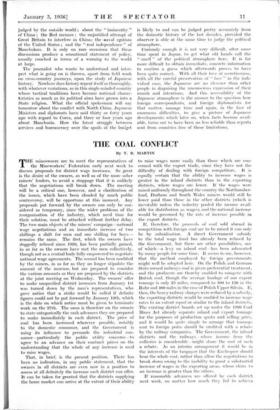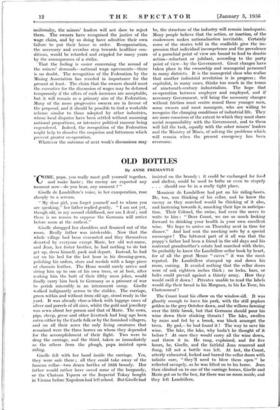THE COAL CONFLICT
By T. B. MARTIN
THE mineowners are to meet the representatives of the Mineworkers' Federation early next week to discuss proposals for district wage increases. So great is the desire of the owners, as well as of the more sober miners' leaders, to avoid a stoppage that it is unlikely that the negotiations will break down. The meeting will be a critical one, however, and a clarification of the issues, which have been clouded by much public controversy, will be opportune at this moment. Any proposals put forward by the owners can only be con- sidered as temporary, since the wider problems of the reorganisation of the industry, which need time for their solution, must be attacked without further delay. The two main objects of the miners' campaign—national wage negotiations and an immediate increase of two shillings a shift for men and one shilling for boys— remains the same. The first, which the owners have doggedly refused since 1926, has been partially gained, in so far as the owners have met the men collectively, though not as a central body fully empowered to negotiate national wage agreements. The second has been modified by the miners, in so far as they no longer stipulate the amount of the increase, but are prepared to consider the various amounts as they are proposed by the districts at the joint meeting on Wednesday. The owners' offer to make unspecified district increases from January 1st was turned down by the men's representatives, who gave notice that a strike would be called if definite figures could not be put forward by January 13th, which is the date on which notice must be given to terminate work on the 27th. The onus is therefore on the owners to state categorically the cash advances they are prepared to make immediately in each district. The price of coal has been increased wherever possible, notably• to the domestic consumer, and the Government is using its influence to persuade the industrial con- sumer—particularly the public utility concerns—to agree to an advance on their contract prices on the understanding that the whole of any increase is used to raise wages.
That, in brief, is the present position. There has been no indication, in any public statement, that the owners in all districts are even now in a position to assess at all definitely the increase each district can offer. It can be taken for granted that the districts supplying the home market can arrive at the extent of their ability to raise wages more easily than those which are con- cerned with the export trade, since they have not the difficulty of dealing with foreign competitors. It is equally certain that the ability to increase wages is greater in the inland districts than in the exporting districts, where wages are lower. If the wages were raised uniformly throughout the country the Northumber- land, Durham and South Wales miners would still be lower paid than those in the other districts (which is inevitable unless the industry pooled the income avail- able for distribution as wages), and the national increase would be governed by the rate of increase possible in the export districts.
If, therefore, the proceeds of coal sold abroad in competition with foreign coal are to be raised it can only be by subsidisation. A direct Government subsidy to the total wage fund has already been refused by the Government, but there are other possibilities, one of which—a levy on inland coal—has been advocated by many people for some time. It seems to me, however, that the method employed by foreign governments might well be adopted here. On the Polish and German State-owned railways coal is given preferential treatment, and the producers are thereby enabled to compete with British coal, though the average haulage of our export tonnage is only 25 miles, compared to 100 to 150 in the Ruhr and 400 miles in the case of Polish Upper Silesia. If, then, the heavy railway charges were reduced by a sub3idy, the exporting districts would be enabled to increase wage rates to an extent equal or similar to the inland districts. The existing district boards set up under the 1930 Coal Mines Act already separate inland and export tonnage for the purposes of production quota and selling price, and it would be quite simple to arrange that tonnage sent to foreign ports should be credited with a rebate by the railway companies. The Government, the inland districts and the railways—Whose income from the collieries is considerable—might share the cost of such a rebate. As an interim arrangement it would be in the interests of the taxpayer that the Exchequer should bear the whole cost, rather than allow the negotiations to break down owing to the inability to grant a substantial increase of wages in the exporting areas, whose claim to an increase is greater than the others.
If reasonable advances are offered by each district next week, no matter how much they fail to achieve uniformity, the miners' leaders will not dare to reject them. The owners have recognised the justice of the wage claim, and by so doing have admittee their own failure to put their house in order. Reorganisation, the necessary and overdue step towards healthier con- ditions, would be retarded and crippled for many years by the consequences of a strike.
That the feeling is easier concerning the second of the miners' demands—national wage agreements—there is no doubt. The recognition of the Federation by the Mining Association has receded in importance for the present at least. The claim that the owners should meet the executive for the discussion of wages may be deferred temporarily if the offers of cash increases are acceptable, but it will remain as a primary aim of the Federation. Many of the more progressive owners are in favour of the proposal, and it should be possible to find a workable scheme similar to those adopted by other industries, whose local disputes have been settled without assuming national proportions, or intensive political rancour being engendered. Indeed, the recognition of the Federation might help to dissolve the suspicion and bitterness which prevent greater co-operation.
Whatever the outcome of next week's discussions may be, the structure of the industry, will remain inadequate. Many people believe that the action, or inaction, of the coalowners makes nationalisation inevitable. Certainly some of the stories told in the coalfields give the im- pression that individual incompetence and the prevalence of a parochial point of view are bound to lead to drastic action—reluctant or jubilant, according to the party point of view—by the Government. Great changes have taken place in the ownership and managerial personnel in many districts. It is the managerial class who realise that another industrial revolution is in progress ; the capitalist, in many cases, thinks too much in the terms of nineteenth-century industrialism. The hope that co-operation between employer and employed, and if necessary Government, will bring the necessary changes without friction must centre round those younger men, some owners and most managers, who are willing to recognise the changing conditions of industrial life. They are more conscious of the extent to which they must share social responsibility with the Government, and to them will fall the task, equally with the sober miners' leaders and the Ministry of Mines, of solving the problems which will remain when the present emergency has been overcome.











































 Previous page
Previous page